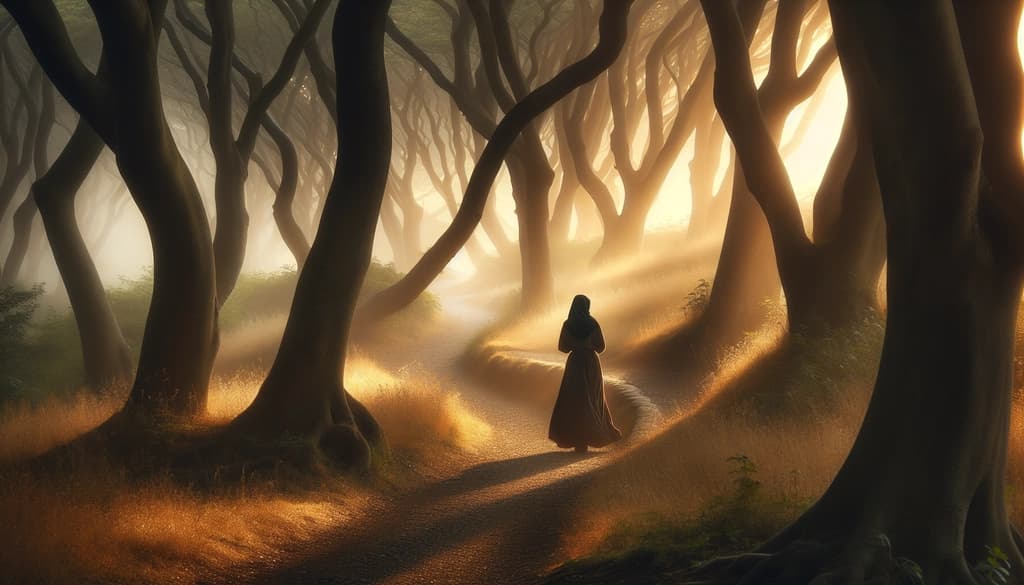Karmic Lessons and Growth: Navigating Dharma, Soul Purpose, and the Work That Calls Us

When Growth Feels Like Missing the Point
There were times I dreaded words like 'karmic lessons.' They conjured up images of cosmic schoolteachers, eternally grading my mistakes. I’d turn over painful moments—relationships that broke, opportunities lost—and wonder, 'Is this my fault? Did I fail some invisible soul test?'
If you’ve found yourself circling the same themes or struggles, you might quietly wonder if you’re encountering another karmic loop. Sometimes we imagine karma as cosmic debt, but my own understanding has softened over the years. If you want to explore further, you might spend some gentle time with the question:What is karma, not intellectually, but as it lives in your body and memory.
Dharma as an Inner Compass (Not a Shouting Order)
When people talk about dharma—your deepest path, right work, or spiritual vocation—it’s tempting to picture a glowing map, complete with arrows and warning signs. But for me, dharma never shouted. It arrived as a strange hunch. A body signal. Sometimes a rebellious urge to do things differently, or to gently quit what once felt essential.
For a while, I didn’t understand the difference between karma, which seemed bound to my past, and dharma, which felt like a moving inner compass. I’ve learned they dance together. If this is confusing (as it has been for me), learning more about the difference between karma and dharma can offer gentle clarity.
If you want to delve deeper into the root of this word and explore its living relevance, I found it helpful to ask myself, What is dharma?—not in abstract, but in the quirks, aches, and longings that shape my path.
Soul Purpose vs Life Purpose: The Myth of Getting It Perfect
I used to believe my soul purpose was a singular, fixed identity—something I could find and finally rest within. But the deeper I listen, the more porous these boundaries become. Sometimes my purpose looks like loving fiercely, even when that breaks me open. Other times it’s the quiet courage to keep showing up, especially when I have no idea where it leads.
In my experience, life purpose often pertains to what the world sees: career, relationships, your impact. Soul purpose is more interior. And at the crossroads of these, I’ve wondered: Is one more important? Are they supposed to match up? If these questions tug at you, what is life purpose spiritually helped me sink into mystery rather than force an answer.
Right Work as a Spiritual Path (Even When It’s Boring, Wrong, or Hard)
I once thought right work would feel ecstatic—like finally stepping into a room where I belonged. Sometimes it does. But more often, it’s the slow, invisible work: apologizing and starting anew, tending the garden of small routines, giving up dreams that no longer fit. The 'right' path isn’t handed down; it’s composted from every time you listened closely, followed your curiosity, or simply survived.
If you’re wrestling with whether you’re on your true path, you might reflect gently on how to discover your path, not as a task to fix, but as something to befriend in your own time.
I’ve also found nourishment in remembering that sometimes my sense of calling looks ordinary, or even ugly from the outside, but still holds a seed of teaching. The old stories call this concept 'sacred duty’—and if you notice tension between what feels fated and what feels free, learning more about the meaning of sacred duty can add new context and care to your journey.
Some days, I hold questions about whether my path is shaped by intention, or by greater forces—dharma, destiny, or some unnamed pull. If it’s the tension between free will and fate that keeps you up at night, there is comfort in pausing with the real distinctions and overlaps that scholars have found in Dharma vs destiny.
The Body as Your Most Honest Witness
It took me years to trust that my body knows when a decision is aligned, even if my mind argues otherwise. There are choices that made my skin itch; others that left my shoulders softer, my breath fuller. If you feel tension, exhaustion, or a sick twist in your gut, these are not failures but information. Growth sometimes means honoring your body’s warning as a sacred stop sign.
Dharma, karma—these are not abstract philosophies. They are lived, somatic realities that whisper through your nerves. If you need permission: you can rest. You can pause. You get to revise the story you tell about your path.
Science and Spiritual Learning: The Quiet Mirroring
Modern psychology sometimes catches up to what soul traditions have long intuited: we learn through friction, not just ease. Neuroplasticity—the brain’s ability to rewire through lived experience—mirrors the way old patterns (karmic or otherwise) shift when met with deep awareness. This growth isn’t always graceful, but it is real.
You’re allowed to grow slowly. Research shows that our sense of purpose and narrative meaning helps buffer adversity and supports psychological healing. But no study can dictate your truth. This is yours to discover, at your own pace.
May You Trust Your Turning Points
Whatever you believe about karmic lessons and growth, may you know this: You do not need to earn your worth through suffering. Your path is sacred, even when it’s circuitous and aching with questions. Trust the compass of your body, the subtle yes and no, and the unmapped wisdom that carries you onward. May you meet yourself gently, wherever you are—unfinished and true.
